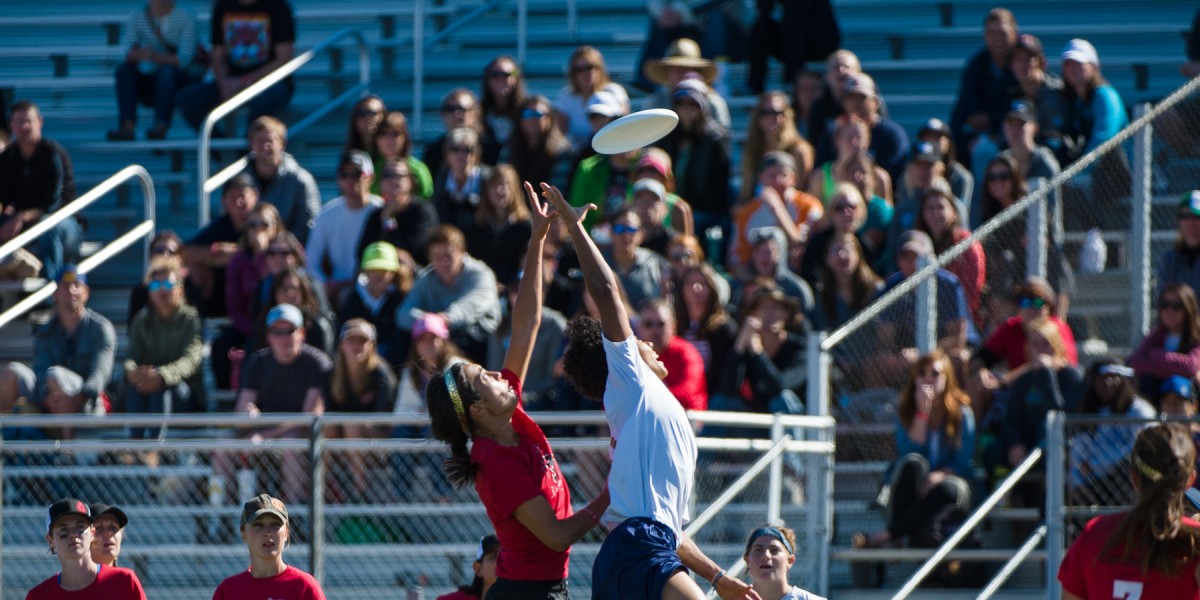 UltiPhotos.com" />
Kevin Leclaire - UltiPhotos.com
UltiPhotos.com" />
Kevin Leclaire - UltiPhotos.com
A little over ten years ago my high school boyfriend asked me if I wanted to go play ultimate with him one afternoon. Having seen a few of my friends tossing a disc around outside our high school theater between rehearsals, I had a small understanding of what the sport might be like. I looked at him with that new young love twinkle in my eye and said, “That looks like the dumbest sport ever. There is no way you will ever get me to play that.” Clearly, I was wrong.
I started playing ultimate because I finally gave in. Almost every day my boyfriend would nag me about how I would love it if I just gave it a try and how if I played, we would get to spend so much more time together. One afternoon, after rolling my eyes at him once he finished his usual spiel, I said yes. I don’t remember why I finally caved, what happened at pick up that day or how I even played, but I remember walking away feeling happy. The running, laughing, falling over, and throwing this piece of plastic around made me want to come back again. And again. And again. Eventually, wondering how we could improve on our recruitment and retention of other women, I started asking other players about their experiences.
The other women I talked to hadn’t been as stubborn as I had. They started playing because someone handed them a flier their first week of college and they decided to give it a try. Other women, tired or too injured from the sport they played in high school, were looking for something new to fulfill their athletic fix. But the most common thread I found between all of us was because we knew or met someone else who played, and that person convinced us it was worth it. I played because of my boyfriend, others played because of their roommates, partners, friends, cousins, or even parents.
At the start of every season, there’s always discussion about how to recruit new players. While playing in small communities like upstate New York and Arizona, talking up ultimate became an everyday event for me because our team always struggled to find enough women to play. So we would search for potential recruits in the gym, the commons, and in our classrooms and dorms, and make a big speech about the benefits of playing ultimate. When my non-ultimate friends asked me why I never had any free time, where I got that huge scar on my arm, or why I couldn’t afford to go out because I spent all my money on tournaments, like a programmed robot, I always ended my answer with “ultimate so much fun, you should come out and try it some time.” For women who already played but weren’t sure about returning, I would try to convince them that this year would be even better than the last, that they would be valued assets to the team, and how we would do everything we could to make sure they were happy. I recruited the way I had been recruited: stubborn persistence.
But recruiting isn’t even half the battle. I could have easily gone to the first practice in college and decided to do something else. But I remember I kept going, not only because of the athleticism, complex strategies, and Spirit of the Game, but also because when we were done, we all went to the dining hall together to eat dinner. Instantly, I had a group of friends who wanted to know everything about me and couldn’t wait to tell me tales of epic tournaments they went to years ago. Teammates constantly asked me if I wanted to throw on the commons, watch movies, or go to midnight breakfast. For the first time in this new and strange place I called college, I felt accepted.
When I emailed my friends asking why they stuck with ultimate, there were two main answers. The first, was the community. One of my former teammates, and now head coach of Arizona’s women’s team, said it best: “The environment that ultimate players create is one that fosters growth, love, and respect for one another, which makes it so appealing to anyone joining.” The second reason was the drive to learn and become a better player. Ultimate is such a complex game both mentally and physically; there is always opportunity to learn and develop more as a player. Because of the community, players trust that they can find the resources and encouragement to succeed in this. It’s truly a remarkable symbiotic relationship: the community betters the player and in turn, the player betters the community.
Every ultimate community in this country has various levels of success with recruiting and retention. There are many ways we can try to recruit and retain female players, but I think no matter what we try, we should always remember that we started playing because someone convinced us to start, and we kept playing because those people who convinced us– as well as many others– supported us, encouraged us, and became our family.
For those searching for more resources on recruiting and retention, I recommend checking out:
Without Limits: Resources Manual
YUCC 2014: Panel Discussion on Girls Ultimate
Recruiting and Retaining Women by Susan De Cicco
“Looking to Recruit Women” by Abhinav Vinayakh Shankar







Comments Policy: At Skyd, we value all legitimate contributions to the discussion of ultimate. However, please ensure your input is respectful. Hateful, slanderous, or disrespectful comments will be deleted. For grammatical, factual, and typographic errors, instead of leaving a comment, please e-mail our editors directly at editors [at] skydmagazine.com.